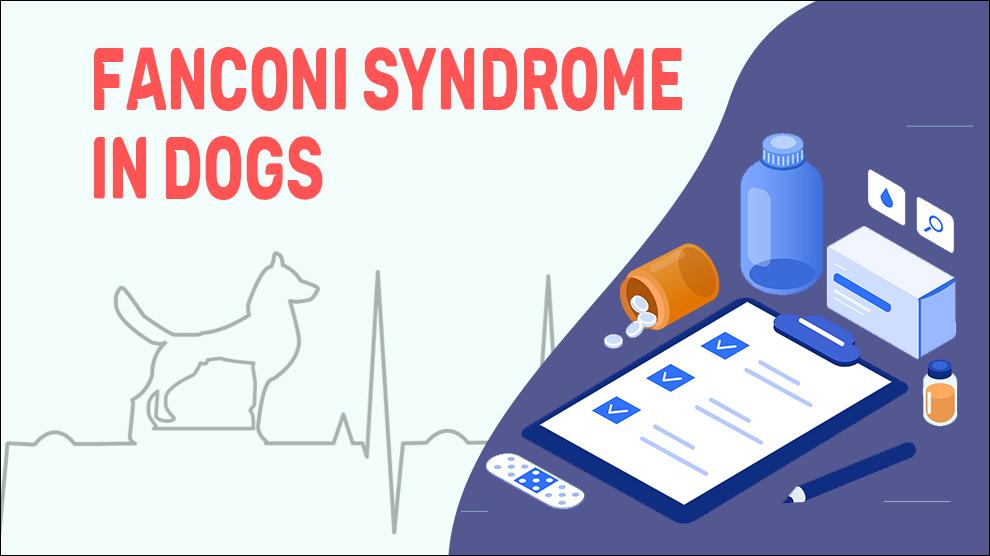Fanconi syndrome is an autosomal-dominant genetic kidney disease of dogs that affects the proximal renal tube of the kidneys. This is a proximal tubular reabsorptive defect as they do not properly reabsorb solutes such as nutrients and electrolytes; instead, they are ‘spilled’ back into the urine to be expelled. The nutrients and electrolytes that are excreted in Fanconi syndrome include Glucose (sugar), Sodium, Potassium, Bicarbonate, Phosphate, and Amino acids.
The condition can also occur secondary to several kidney issues of your dog such as having developed infections, Hypoparathyroidism, Congenital renal dysplasia, an abnormal collection of cells or tissues in the kidneys, and dogs that have experienced drug reactions or consumed toxins.
Approximately 80 percent of reported Fanconi syndrome cases have occurred in the Basenji breed. It is assumed to be a hereditary trait in this breed, however, the mode of inheritance is unidentified.
Idiopathic Fanconi syndrome has been reported sporadically in several different breeds, including Labrador retrievers, border terriers, whippets, Norwegian elkhounds, Shetland sheepdogs, and Yorkshire terriers. There is no gender predilection and the most affected dogs develop clinical signs between two to four years.
Symptoms Of Fanconi Syndrome
- Excessive thirst (polydipsia)
- Excessive urination (polyuria)
- Diarrhea
- Reduced appetite/ Weight loss
- Lethargy
- Seizures (in 15% of cases)
- Reduced and/or abnormal growth (rickets) in young, growing animals
Treatment Options For Fanconi Syndrome
The treatment of Fanconi syndrome varies depending on the underlying cause, the dog's overall condition, and the severity of symptoms.
Sometimes, dogs require clinic visits and hospital admission to recover.
Aggressive treatments may include hospitalization for a kidney transplant, dialysis, Temporary Feeding Tube, or intravenous (IV) fluids.
For milder cases - antibiotics, fluid therapy, Supplementation, and other medications to maintain normal acid-base balance.
Treatment of appetite changes, blood pressure alterations, anemia, fluid imbalances, electrolyte disturbances, gastrointestinal problems, and nausea is typically necessary.
Home Remedies For Fanconi Syndrome
Prevention Of Fanconi Syndrome
- Keep dogs away from household chemicals such as antifreeze and other cleaners.
- Keep raisins, Grapes, prescription and OTC drugs, like ibuprofen out of reach of dogs.
- Clear away contaminated water sources.
- Vaccination against infectious diseases (like leptospirosis) can prove highly effective to prevent kidney failure.
Affected Breeds Of Fanconi Syndrome
Basenji, Norwegian Elkhound, Labrador Retriever, Shetland Sheepdog, Minature Schnauzer
Additional Facts For Fanconi Syndrome
1. Causes:
- Congenital renal dysplasia
- Renal tubular acidosis
- Ingestion of toxins, chemicals
- Heavy metal exposure
- Hypoparathyroidism
- Abnormal collection of cells or tissues in the kidneys
2. Types:
Primary Fanconi syndrome: This is an autosomal-dominant genetic renal disease that occurs in Basenji dogs.
Secondary Fanconi syndrome: This condition can develop secondary as a result of several kidney issues causing damage to the proximal renal tube, leading to a disruption in kidney function.
3. Mortality:
Fanconi syndrome is a progressive, renal disease and if it is not treated properly, it will lead to renal failure. After a diagnosis of Fanconi syndrome, the Median survival time is 5 years.
4. Diagnosis:
- Inflammatory or infectious disease testing (in certain cases)
- SDMA test: SDMA (a naturally occurring biological indicator for kidney function)
- IRIS (The International Renal Interest Society) staging system - urine protein: creatinine ratio [UPC)
- Urine testing (urinalysis and urine culture)
- Abdominal ultrasound
- Blood work evaluation
5. Prognosis:
Fanconi syndrome cannot be cured but it can be managed successfully using medications.
In some dogs, medical management will offer much-needed healing time for kidneys and in other cases, dogs may recover but develop permanent damage that is clinically significant leading to chronic kidney diseases.
What is more important to consider is that the degree of elevation in kidney values does not always connect with the outcome. With prompt care, many dogs that originally had significant dysfunction can have good outcomes.
When To See A Vet
Contact your vet right away, if you notice any of the following:
- Fluid retention of the face, legs, and ankles (edema)
- Decreased or no urine output often
Food Suggestions For Fanconi Syndrome
Low protein, reduced amounts of sodium and phosphorus, with increased levels of omega-3 fatty acids, potassium, and high-alkaline foods.
Protein: 14-20%, 35 g/1000 kcal of high-quality protein
Sodium: ≤ 0.3%
Phosphorus: 0.2 - 0.5%
Potassium: 1.1- 2-3%
Omega-3 fatty acids: 1 g of EPA and DHA per 1000 kcal of diet = 25 mg/kg of DHA combined with 40 mg/kg EPA q24h
High alkaline foods:
- Green Leafy Vegetables
- Root vegetables
- Almonds
- Avocado, Cucumber, Beets, Figs, and Apricots
Conclusion
Fanconi syndrome in dogs that go unmanaged is deadly. When you suspect any kidney-related issues with your dog, don’t try to treat the condition with any conventional home remedies.
Discuss with your vet to get a practical prognosis for your dog's treatment after a proper diagnosis and examination.

















